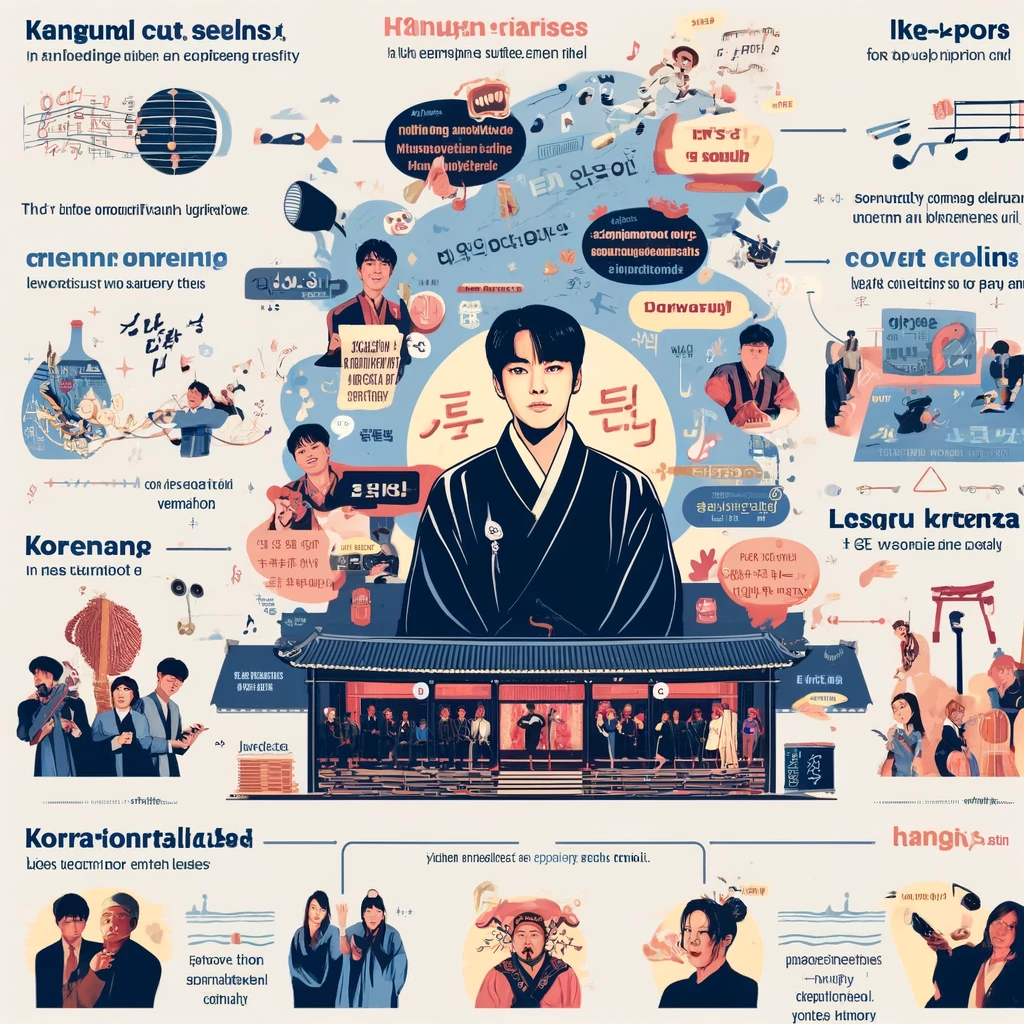목차
Hangul in K-Pop and Korean Drama: Explore how Hangul is utilized in K-pop lyrics and Korean drama
The global ascent of K-pop and Korean drama (K-drama) has not only spotlighted South Korea’s entertainment industry but also its language, Hangul. The Korean alphabet, with its unique structure and design, plays a pivotal role in the cultural export of Korean music and television. This exploration delves into how Hangul is utilized in K-pop lyrics and K-drama subtitles to convey meaning, emotion, and cultural nuances, contributing significantly to the global Korean Wave, or “Hallyu.”

Hangul’s Role in K-pop
K-pop is characterized by its eclectic mix of musical styles, visually stunning music videos, and highly synchronized choreography. However, at the heart of K-pop’s appeal are its lyrics, written in Hangul, which carry deep emotional weight and cultural references that resonate with both domestic and international audiences.
Emotional Expression and Wordplay:
Hangul’s composition allows for expressive and nuanced lyrical content. Its alphabet can be manipulated to create wordplay, puns, and double entendres that are often lost in translation. The ability to combine words or break them apart in song lyrics can convey multiple layers of meaning, adding depth to the listener’s experience. For instance, the title of BTS’s song “봄날 (Spring Day)” evokes not just the season but also feelings of longing and renewal, themes that are recurrent in its lyrics.
Cultural References and Identity:
Many K-pop songs incorporate distinctly Korean elements, both traditional and modern, through their lyrics. References to Korean literature, history, and idioms rooted in Hangul enrich the songs, offering insights into Korean culture. For example, G-Dragon’s use of traditional Korean games and folklore in his lyrics bridges contemporary music with cultural heritage, making the language an essential tool for cultural expression.
Hangul in K-drama Subtitles
K-dramas are renowned for their gripping storylines, emotional depth, and cultural richness. As K-dramas have gained international fans, the role of Hangul-translated subtitles has become crucial in bridging cultural and linguistic gaps.
Conveying Nuances and Honorifics:
Hangul is particularly effective in expressing levels of formality and respect through its use of honorifics. These nuances are vital in K-dramas, where relationships and social hierarchy play significant roles. Subtitles strive to reflect these subtleties, though the layers of meaning in Hangul can sometimes exceed the expressive capacity of English or other languages, highlighting the richness of the Korean language.
Cultural Context and Slang:
K-drama subtitles often include explanations for cultural references, proverbs, and slang, which are deeply rooted in Hangul and Korean culture. This not only makes the viewing experience more enriching but also educates the audience about Korean societal norms and values. For instance, the use of unique Korean terms of endearment or slang provides a glimpse into the informal and intimate aspects of Korean life.
Challenges of Translation
Translating Hangul into other languages presents challenges, particularly in retaining the original meaning, tone, and cultural context. Nuances and wordplay in K-pop lyrics or K-drama dialogues often rely on the specificities of Hangul, which can be difficult to convey in a different linguistic framework. Translators must navigate these complexities to preserve the integrity of the original content while making it accessible to a global audience.
Conclusion
Hangul is not merely a script but a vessel of Korean culture, emotion, and identity. In the realms of K-pop and K-drama, Hangul serves as a bridge connecting Korea to the world, allowing global audiences to partake in its rich cultural narratives. The use of Hangul in lyrics and subtitles is a testament to the power of language in transcending boundaries, facilitating a deeper understanding and appreciation of Korean culture. As K-pop and K-drama continue to captivate hearts worldwide, Hangul remains at the core of this cultural phenomenon, symbolizing the beauty and complexity of the Korean language and its ability to convey profound meaning and cultural nuances.
Go Blog Home
